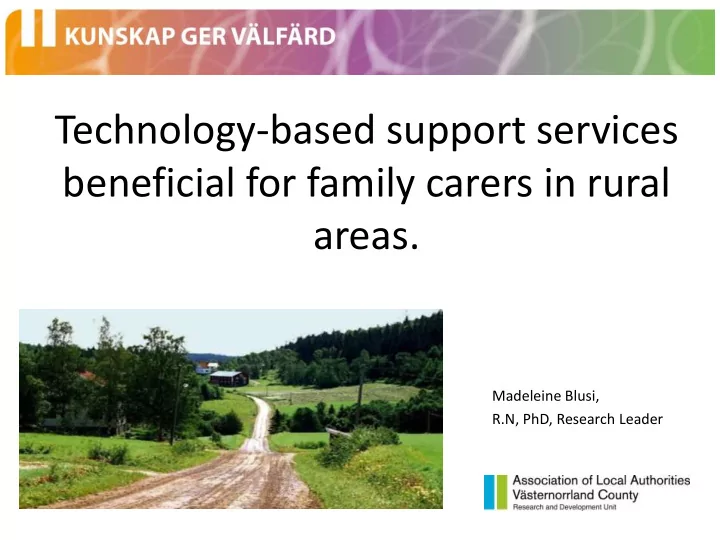

Technology-based support services beneficial for family carers in rural areas. Övergripande strategiskt arbete Madeleine Blusi, R.N, PhD, Research Leader
The rural context • Long distances to service • Fewer available formal services • Depopulation Övergripande strategiskt arbete • Large proportion of older people • Many cronically ill cared for at home by spouse • Lack of health-care professionals There is a need for new ways to support rural carers!
Can technology-based support be as good as traditional support ? Övergripande strategiskt arbete Or at least good engough?
Definitions of Rural EU/OECD - less than 150 inhabitants per km2 Övergripande strategiskt arbete Sweden - less than 7 inhabitants per km2 Our area: 4,5 inhabitants per km2
Europe Population: 381 552 Övergripande strategiskt arbete
A study with comparative design • Spouse carers > 65 yrs (n=95) • Intervention group - technology based carer support • Control group – traditional carer support Övergripande strategiskt arbete • Long term follow up after 1,5 years • Qualitative and quantitative measures Data Analysis Web-camera interviews Content analysis Telephone interviews ” Questionnaires Logistic regressions Comparative statistics
Variable All Participants Intervention Control Group n=95 Group n=32 n=63 Caregiver age, mean (range) 74(65-85) 74(65-85) 75(65-84) Care recipient age, mean (range) 76(65-97) 76(65-97) 77(65-89) Gender of caregiver Övergripande strategiskt arbete Women 65(68%) 45(71%) 20(62%) Men 30(32%) 18(29%) 12(38%) Care recipients with dementia 36(40%) 27(43%) 9(28%) Previous experience of using computer Much experience 3(3%) 2(3%) 1(3%) Little experience 51(54%) 36(57%) 15(47%) No experience 41(43%) 25(40%) 16(50%) Level of education Primary school 54(57%) 30(47%) 26(81%) Secondary school 26(27%) 23(37%) 2(5%) Higher education 15(16%) 10(16%) 4(14%)
The intervention ACTION (Assisting Carers using Telematics Interventions to meet Older People’s Needs ) Participants had: Övergripande strategiskt arbete - High speed internet - Computer., Webcamera - Information- and educational software - Games • Professional support staff • On-line community with peers Foto: Barbro Jansson
Övergripande strategiskt arbete Tot: 69 different support activities.
Quntitative results - comparison • Intervention group significantly more satisfied with overall benefits (p<0.002) • Intervention group higher score on - preparedness (p<0.008) - enrichment (p<0.037) - predictability (p<0.03) Instrument: Carer effectivness scale CES, (Archbold, Stewart and Miller, 1995)
Example from content analysis Comprehensive FLEXIBILITY AND AVAILABILITY ESSENTIAL FOR MEETING CARERS NEEDS Theme Group Intervention group Control group Övergripande strategiskt arbete Category Flexibility Availability Unmet needs Sub categories Choosing suitable Always someone to Wrong sort of support information ask Limited availability Insufficient support Deciding the time of Accessible at odd support hours Organisations needs outrank Matching support On demand carer’s needs activities with .. current needs
Findings intervention-group More contact with Pride, grandchildren Regaining a Self esteem, position in Digital Övergripande strategiskt arbete society inclusion Improved QoL A more competent carer
Övergripande strategiskt arbete
Conclusions • Technology-based support can be as good as, or even better than, Övergripande strategiskt arbete traditional support in rural areas. • Flexibility and availability are essential for meeting carers needs. • Technology-based support changes the role of professionals
Thank You! Övergripande strategiskt arbete madeleine.blusi@kfvn.se
Publications related to ACTION in the North Blusi M., Asplund K., & Jong M. (2013). Older family carers in rural areas: experiences from using caregiver support services based on Information and Communication Technology (ICT). European Journal of Ageing, 10 (3), 191-199. doi: 10.1007/s10433-013-0260-1 Blusi M., Dalin R., & Jong M. (2014). The benefits of e-health support for older family caregivers in rural areas. Journal of Övergripande strategiskt arbete Telemedicine and Telecare, 20 (2), 63-69. doi: 10.1177/1357633x13519901 Blusi M., Kristiansen L., & Jong M. (2015) nternet based caregiver support counteracts isolation among older spouse caregivers in rural areas. International Journal of Older People Nursing. Blusi M., Dalin R., Kristiansen L., & Jong, M. Utilization of e-health caregiver support among older family caregivers in rural Sweden. Submitted 2015. Blusi, M (2014) E-health and Information- and Communication Technology (ICT) as support systems for older family caregivers in ruaral areas. Doctoral Thesis no 203, Department of Nursing Sciences, Sundsvall; Mid Sweden University. ISBN 978-91- 87557-87-3 Bergström I., Blusi M., & Höijer, C. (2010). Evaluation of ACTION. Family care support in rural areas (In Swedish), Report no. 10210, Swedish Institute for Assistive Technology, Vällingby .
Recommend
More recommend